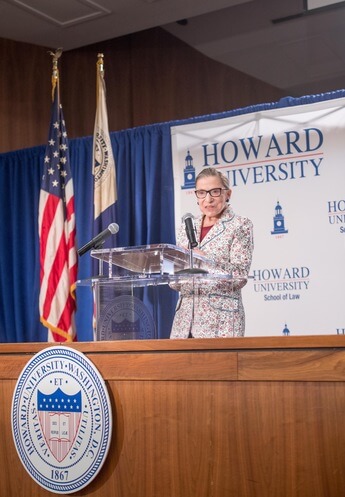 Dear Howard University Community,
Dear Howard University Community,
It is with tremendous sadness that I share news of Supreme Court Justice Ruth Bader Ginsburg’s passing. In her 87 years of life and 27 years of service on the United States Supreme Court, she was a tenacious champion of equality—for women and for all underrepresented and marginalized communities. Standing at only five feet tall and weighing in at only 100 pounds, she was a relentless fighter on behalf of her judicial philosophy and moral barometer, proving again and again that one’s stature is not determined by the shadow we cast, but by the power of our voice and the causes that compel us to use it.
Later in life, her legacy seemed to finally catch up to the impact she had throughout a monumental and groundbreaking legal career. Known as Notorious R.B.G, she became a cultural icon. For years, her no-nonsense expression and the legendary collar that adorned her black justice robes became ubiquitous across social media and emblazoned on the backpacks and t-shirts and bodies of the young people who idolized her.
Justice Ginsburg’s titanic influence, however, could not be reduced to Internet memes; her importance and relevance persisted beyond the typical transience of contemporary popularity. Culminating with two feature films in 2018—one documentary and one fictional account of her life—her widespread fanbase learned more of her life and the true essence of the change she helped to usher into the legal profession and our society at large.
Before she ever sat on the Supreme Court or the United States Court of Appeals, she was a trailblazing lawyer who fought for discrimination on the basis of sex to receive the same standing and legal recognition as discrimination on the basis of race. By combining her brilliant legal intellect with an understanding of how to persuade the male justices who sat on the bench before her, she was able to win crucial and hard-fought rights for women that paved the way for their greater participation in our society, our economy, and our country.
As a judge, she would go on to further enshrine these principles in the law with her numerous court opinions. In many cases throughout her career, she sought to build coalitions with her fellow justices, writing majority opinions that set down important legal precedents. Her friendship with conservative Justice Antonin Scalia, who died in 2016, was well known in Washington, D.C., and more broadly. Despite their strongly contrasting judicial philosophies as well as their disagreements on many of the cases they heard together on the court, they were able to maintain a deeply personal respect and fondness for one another. Their friendship became an inspiration to many who resented the increasing polarization and partisanship of our country and hoped that respect could exist even among individuals who disagreed with one another.
But especially later in her career, Justice Ginsburg became known for her blistering dissents, her willingness to speak truth to power and stand up for what she believed in, despite falling in the minority on the court. She became the leader of the liberal bloc and an unyielding advocate for progressive causes. Her passion and energy never seemed to wane, despite the numerous health issues she experienced. Following stints in the hospital, she would always return to work, ready and eager to fight.
Justice Ginsburg was the first Democratic appointee to the Supreme Court since Thurgood Marshall, our esteemed alumnus of the Howard University School of Law, was appointed by President Lyndon Johnson. Many say that she picked up his mantle and pursued equality for women with the same fiery intensity that Justice Marshall pursued justice for Black Americans. Howard University was privileged to welcome Justice Ginsburg to our campus in 2017 for the “Singing of a New American” event that honored the legacy of Howard graduate and civil rights lawyer Pauli Murray. Often throughout her career, Justice Ginsburg would cite Murray as an inspirational figure and describe the strong influence the iconic lawyer had on her.
In passing as in life, Justice Ginsburg will continue to have an abiding and consequential presence on the lives of many. She was a significant figure for numerous different communities who held her with the utmost reverence, respect, and esteem.
As one of our country’s most prominent Jewish figures, it can be no coincidence that Justice Ginsburg’s death coincided with the holiday of Rosh Hashanah, the Jewish New Year and one of the holiest days on the Hebrew calendar. It is a holiday associated with reflection and rededication, renewal and rebirth. What an appropriate opportunity to contemplate Justice Ginsburg’s ever-burnishing legacy and the world we should strive to perfect in honor of her blessed memory.
Excellence in Truth and Service,
Wayne A. I. Frederick, M.D., MBA
President




